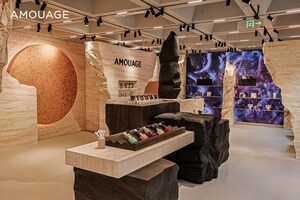S'Young International Hosts Exclusive Cosmetics Forum, Offering Insights on China's Beauty Market in Post-Covid Era
SHANGHAI, March 24, 2023 /PRNewswire/ -- S'Young International ("S'Young", "the Company"), the initiator of the CP (China Partner) cooperation model, a digital-driven open platform for global beauty brands to connect with the Chinese market, hosted an exclusive cosmetics forum at Palazzo Gnudi, Bologna, Italy on March 17, joining Tmall Global, China's largest cross-border online marketplace and Pier Augé, a beauty product innovator for sensitive skin, to discuss the reality of China's beauty market in the post-pandemic era. At the event, Marshall Chen, CEO and Co-founder of S'Young International shared his insights on the DON'Ts and DOs that help global beauty brands in navigating the challenges and reaping the benefits in the changing Chinese market.
As China eased its Covid-19 prevention measures, the Chinese beauty market has shown greater growth potential. Data indicated that beauty consumption per capita in China still has five times more room to increase. However, Marshall also warned that despite the booming Chinese beauty market's many opportunities, it is fraught with difficulties too. Targeting the challenges, Marshall provided three essentials DON'Ts to help brands avoid the potential pitfalls:
- DON'T UNDERESTIMATE THE COMPETITION
- DON'T MIX DIFFERENT CONSUMERS
- DON'T SIMPLY COPY PREVIOUS EXPERIENCES OF SUCCESS
Current Chinese beauty space could be roughly divided into three categories: Chinese domestic brands, well-known international brands, and niche international brands. The competition between the first two categories is fierce, while niche brands often enter the market by targeting specific market segments to avoid intense competition. To enter these specific market segments, brands need to focus on building their brand image for a more targeted audience. China's urban structure ranges from first-tier to eighth-tier cities, and is influenced by different channel environments and marketing conditions. To efficiently grow a brand, it is important to differentiate the marketing strategies according to the city tier. Compared to overseas markets, the Chinese beauty industry has a higher percentage of e-commerce channels, and is highly reliant on social media and short-video marketing. It is also important to pay attention to the differences in beauty demands among Asian ethnicities, which requires differentiation from overseas market strategies.
Then under the current circumstances of the Chinese beauty market, how can brands survive and achieve long-term success in such a complicated market with promising prospects and diverse challenges? Marshall responded to the question with three essential DOs:
- DO START WITH WANTs
- DO BRANDING
- DO BUILDING A BRAND LIKE RAISING A CHILD
"Given the intricacy of the beauty market in China, brands must not only identify customers' explicit needs but also their underlying desires to provide innovative products that satisfy their individual demands. For example, a traditional foundation or a product for skin-whitening can only meet the basic needs of Chinese customers whereas products such as drinkable supplements from a Spanish cosmeceutical brand for whitening and a longwear foundation with Milanese fashion DNA can provide additional benefits that cater to their deeper demands," said Marshall.
He also highlighted the significance of brand-building in the current scenario, emphasizing that beauty brands need to explore their brand strengths, historical roots, and cultural identity. This is crucial to develop a distinct and appealing brand image that strikes a chord with customers and differentiates them from rivals in the fiercely competitive and congested beauty industry in China. Furthermore, to build a successful brand in a holistic manner, it is also essential to integrate product development, marketing strategies, efficient operations, and logistics management for both online and offline cross-border and domestic sales.
At the event, Kristina Hui, Head of Beauty UK & Nordics at Tmall Global, introduced the rapid digital evolution of China's retail landscape in the past years. She also pointed out that the changes brought by the pandemic have prompted the platform to seek new solutions to connect and engage with customers.
Charles Dupont, CEO of Pier Augé, shared the importance of choosing the right China partner that can help global brands achieve sustainable growth in the long run. In 2022, Pier Augé and S'Young reached strategic cooperation. Under the CP collaboration model, leveraging S'Young's expertise in China's market, the sales of Pier Augé's flagship product Douce Aura, clocked a whopping 259% year-on-year growth. Pier Augé's popularity among Chinese customers skyrocketed as a result and saw its sales figure quadruple in 12 months.
"As the Initiator of the CP collaboration model, S'Young has partnered with over thirty international brands to provide them with market expertise and essential tools to overcome challenges and achieve sustainable growth in China. Our all-dimensional solutions encompass brand positioning, unique communication strategies, marketing, retailing, and supply chain management, and we work alongside our partners to clarify their primary objectives and map out action plans for each developmental phase, enabling them to create hero products and establish robust omnichannel capabilities. To achieve this, we forge in-depth, couple-like cooperation with our partners to guarantee their brand success in China, just like raising a child through tight collaboration," said Marshall.
About S'Young International
S'Young International, the Initiator of the CP collaboration model, is a digital-driven open platform that empowers global beauty brands to access and connect with the Chinese market by providing a complete solution that focuses on their all-dimension, omnichannel and full-lifecycle development. S'Young International has now cooperated with more than 30 beauty brands globally.





Share this article